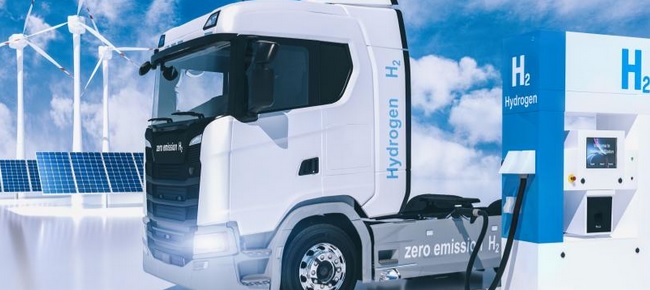Green hydrogen could be cheaper for heavy trucks than diesel by 2031
A green hydrogen economy is perfectly feasible as production gets cheaper over the next decades, says BloombergNEF.
With crude oil costing just $25 per barrel, heavy-duty vehicles and ships might be little inclined to switch to alternative fuels shortly. The same goes for fuel-dependent steel and cement industry. Still, in its recent global and independent study entitled Hydrogen Economy Outlook, BloombergNEF (BNEF) reckons that the falling cost of making hydrogen from wind and solar power offers a promising route to cutting emissions – at a manageable cost.
The report’s findings suggest that renewable (green) hydrogen could be produced for $0.8 to $1.6/kg (€0.73 to €1.47) in most parts of the world before 2050.
Green or not at all
For hydrogen to have net environmental benefits, it needs to be produced from clean sources rather than from unabated fossil fuel processes – the usual method at present, BNEF says.
The green way of producing hydrogen is to use (superfluous) wind and solar energy to split water into hydrogen and oxygen. The technology to do this has become 40% cheaper over the last five years – and it could become a lot more cost-competitive if development continues.
The biggest challenge has to do with transport and storage. It will take a lot of investment in infrastructure, but “If the clean hydrogen industry can scale up, many of the hard-to-abate sectors could be decarbonized using hydrogen, at surprisingly low costs,” says Kobad Bhavnagri, head of industrial decarbonization for BNEF and lead author of the report.
Heavy trucks could also be cheaper to run on hydrogen than diesel by 2031, although batteries remain a cheaper solution for cars, buses and light trucks.
Subsidise hydrogen, not fossil fuel
For hydrogen to gain use, policy is critical. “The clean hydrogen industry is currently tiny and costs are high. There is big potential for costs to fall, but the use of hydrogen needs to be scaled up and a network of supply infrastructure created,” Bhavnagri said.
“This needs policy coordination across government, frameworks for private investment, and the roll-out of around $150 billion (€137 billion) of subsidies over the next decade,” he added. “That may sound daunting but it is not, in fact, such a huge task – governments around the world currently spend more than twice that every year on fossil fuel consumption subsidies.”
“Hydrogen is promising and powerful because it can be used for so many things. Renewable energy has paved the way to carbon-free electricity. But to meet net-zero emissions targets, we need to go beyond electricity and have carbon-free fuels. That is the role for hydrogen.”
Photo credit: Shutterstock, 2020
Source: https://www.globalfleet.com
FLEET MANAGEMENT NEWSLETTER
Join to our NEWSLETTER; you’ll get the latest news, articles, publications, training, conferences, events, congresses, and white papers related to Fleet Management, Mobility and Automotive IN your email fortnightly.




